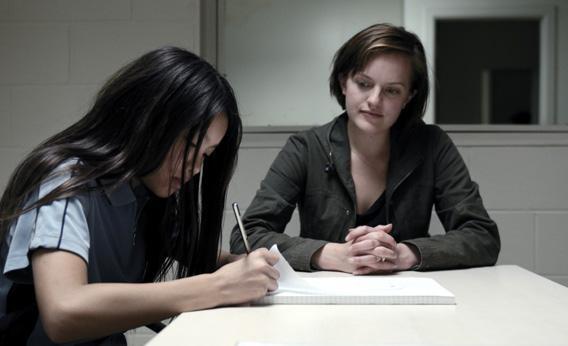In the first episode of Jane Campion’s Top of the Lake (Sundance, Mondays at 9 p.m. ET), amid much spooky stillness and strange fable-making, protagonist Robin Griffin (Elisabeth Moss) informs her ailing mother that she has to leave home on a business trip. Robin lives in Sydney, but when we meet her, she’s returned to Queenstown, New Zealand, to tend to a familiar agenda of unfinished emotional business. Then duty calls in connection with a child-welfare case: A crime lord’s daughter is 12 years old and five months pregnant.
When Robin tells her mother that she’ll be going away for a couple days—that her heroine’s journey will take her to the breathtaking landscape of the title—Mom tries to guilt her out of it. And Robin says: “Why do I feel manipulated?”
Why? Because you’re a Jane Campion character. It comes with the territory, and I should think, even halfway through the first hour of a seven-episode miniseries, you’d be accustomed to the treatment. Have you noticed your own name, with its shameless juxtaposition of soaring imagery (the vulnerable songbird, the fiercely protective beast)? Remember the extreme Plathiness of the moment whether you caressed your late father’s lace-ups while whimpering, “Daddy”?
Top of the Lake is a curiosity among crime dramas. It’s a mood piece posing as a detective thriller—and simultaneously deconstructing its genre like a feminist essay. Craggy baddie Matt Mitcham (Peter Mullan) is not just the patriarch of a crime family but a cackling representative of the patriarchy—well-connected among the paternalistic authorities and well-accessorized with phallic symbols. Robin is an agent of the sisterhood—not just an archetypal grown-up girl detective, but a pure archetype.
And then we have GJ, a shaman figure played by Holly Hunter as a spectral androgyne. She’s a guru leading a tribe of post-menopausal Amazons. An acolyte explains: “There’s a lot of women here in a lot of pain. They come from abused marriages; broken hearts, sex addicts ….” As if inhabiting an art installation, GJ and her followers live in shipping containers on a plot of land with a symbolically heavy name, leading Mitcham to ruefully say, “My mother is buried in Paradise.”
Oh, dear. For my money, Campion has done her most sophisticated work when constrained by source material, tempering her allegorical tendencies in support of telling a novelist’s realist narrative (Portrait of Lady) or a poet’s Romantic saga (Bright Star). But she’s most famous for The Piano, featuring Hunter as a mute woman who expresses herself only through music and Harvey Keitel as a noble savage. This series likewise gives us Campion at her most maddeningly myth-mad.
Top of the Lake, which Campion co-wrote with Gerard Lee, adheres slavishly to some conventions of the suspense film while subverting others—most notably the ones that traditionally lend it suspense. Campion has said, in interviews, that her idea of a good cop show is The Killing, so consider that a heads-up: The scenes among GJ’s tribe of seekers are reliably more lively than any involving police work.
The pregnant girl goes missing, and Robin leads the manhunt. Moss executes many memorable piercing stares as Robin, whose will is as firm as her build is slight. But the role seems both demanding and thankless: It’s hard to shake the feeling that the character is competing in a Jodie Foster impersonation contest. And it’s impossible to tell which of the series’ frequent resorts to hoary convention are the confrontations of a deconstructionist and which are lapses of an art-house director going mad for pulp.
Campion nonetheless sustains an eerie mood. The series begins with a shot of the pregnant girl walking into frigid water—presumably either hoping to induce a miscarriage or preparing to drown herself—and the chill of the scene carries through the rest of Top of the Lake. The icy blues of the street scenes and the humbling grandeur of the mountain landscapes contribute to a sense of majestic menace. It’s an atmospheric drama, and the air is thin, and when Top of the Lake succeeds, it’s as a triumph of asphyxiating tone. As such, it’s a minor entry in the special genre of the New Zealand thriller. Like Peter Jackson’s Heavenly Creatures, the paranoid screenplays of Andrew Niccol, and the absurdist horror of Black Sheep (an ovine analog of The Birds), it gets beneath the skin by examining the state of isolation at the bottom of the world.
